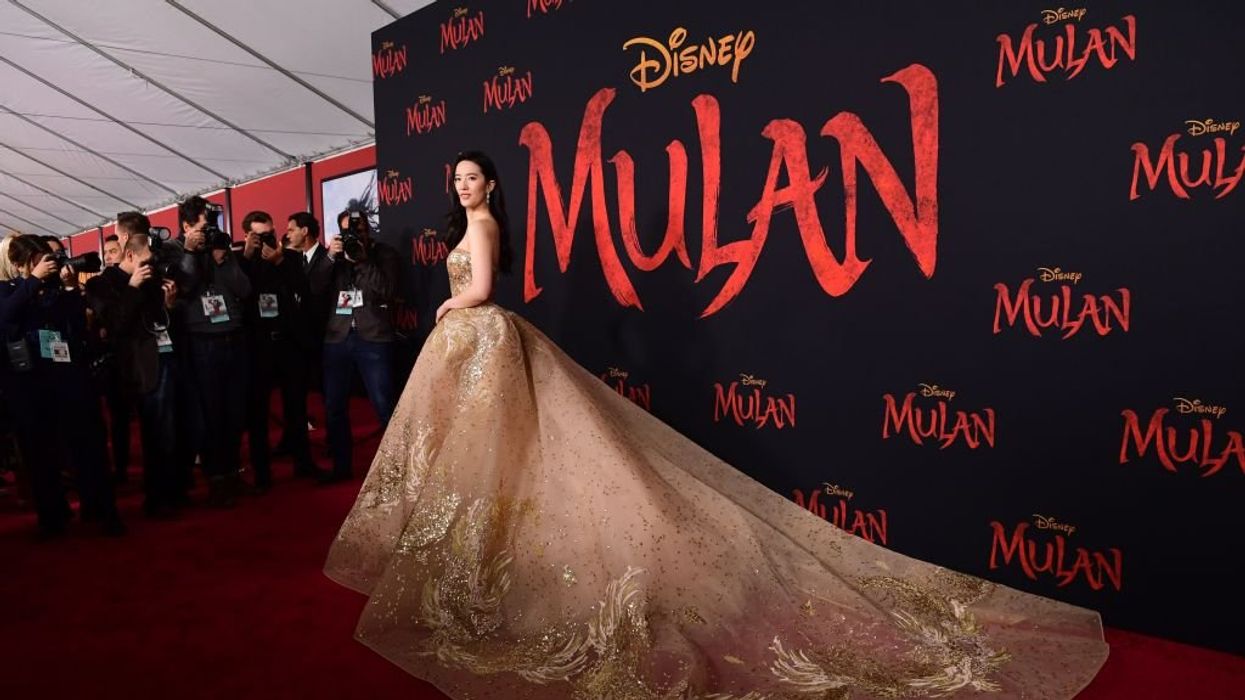
FREDERIC J. BROWN/AFP via Getty Images

Ignore the woke hysteria surrounding its ill-fated 2020 release — 'Mulan' is a beautiful ode to virtue, patriotism, and filial piety.
Almost a decade ago, Disney announced that it would finally be moving ahead with a live-action remake of “Mulan.”
The animated musical adventure was a huge hit when released in 1998. But now it was 2015, and anxieties surrounding race, transgenderism, and workplace sexual harassment were nearing their peak.
This Mulan is not the liberal feminist icon she’s been made out to be; she’s more Joan of Arc than Captain Marvel. What drives her is love, not ambition.
In retrospect, not the best time for an American company to tell a story set in ancient China and inspired by a well-known Chinese legend. Nor was it the ideal environment in which to cast a heroine who disguises herself as a man to in order to join the imperial army only to fall in love with a superior officer.
From the beginning, calls to oust white artists from the project trended online. Disney attempted to play ball; its first choice of director, Ang Lee, was unavailable to direct.
Mulan's love interest from the original film, Captain Li Shang, was dropped in exchange for two new characters in response to the #MeToo movement. Producer Jason Reed explained that "having a commanding officer that is also the sexual love interest was very uncomfortable, and we didn't think it was appropriate.”
This then upset LGBT activists who had, unbeknownst to the world outside their bubble, claimed Li Shang as a “bisexual icon.” Production’s attempts to conform to one moral crusade led to accusations of “erasure” by another.
“Mulan” was finally ready for release in early 2020; by then other problems had emerged. It was revealed that some of the film’s landscape B-roll was shot in the northwest region of Xinjiang, where the government had infamously erected re-education camps for Uyghurs and other Turkic Muslim minorities to retaliate for terror attacks by Sunni separatists.
Western governments and assorted NGOs urged Disney to condemn China. While Disney didn’t fold, the Chinese found the company’s lukewarm defense insulting enough to instruct state media not to cover the movie’s domestic release.
The final and perhaps most devastating setback had to do with the film’s original premiere date: March 2020. While Disney did pull off the standard gala Hollywood screening, COVID and its attendant lockdowns squashed plans for a wide release.
By the time “Mulan” finally crept into multiplexes that July, Disney, eager to be rid of the problem, had done little to promote it.
Those who reviewed the movie largely seemed to do so through the ubiquitous lens of identity politics, which constrained their thoughts to the political context surrounding the production rather than the story itself.
Critic Joonatan Itkonen’s dismissive reaction was exemplary: “Mulan is a film best described as an ‘if only’ production. If only the script had the input from actual Chinese people.”
Never mind that Disney had originally sought an Asian director and boasted a cast and supporting crew that was nearly 100% ethnically Chinese — so very Chinese, in fact, that in 2019, lead actress Liu Yifei sparked controversy by condemning the pro-democracy riots in Hong Kong. Given the exacting, contradictory demands of the time, it should come as no surprise that “Mulan” also lost points for being too Chinese.
In retrospect, I think its harshest critics owe “Mulan” a reappraisal, if not an out-and-out apology.
I watched the movie with my family this week and found myself pleasantly surprised by how good it was. It was visually and audibly stunning, with a physicality to its performances that gracefully incorporates elements of Chinese kung fu film tradition.
The creators tone down the animated film’s goofiness in order to make something more serious — which in fact brings the story closer to its epic source material, "The Ballad of Hua Mulan."
Particularly impressive was the film’s emphasis on honor, virtue, and a specifically Chinese concept of filial piety. Mulan risks death not for her own “self-realization” (an all-too-common motivation for contemporary heroines) but rather to protect both her father and the father of her nation: the emperor.
When she reveals her true identity to the men in her unit, they reject her. A shape-shifting witch-warrior on the enemy side (a creative reimagining of the hawk from the animated film) offers her solidarity in this moment of cold exile.
Mulan rejects her, saying, “I know my place, and it is my duty to fight for the kingdom and protect the emperor.” The sword she carries, stolen from her father, is emblazoned with three Chinese characters: 忠、勇、真 (loyal, brave, and true).
After she saves the emperor, he gives her a new sword, one emblazoned with an additional virtue: filial piety (孝).
This Mulan is not the liberal feminist icon she’s been made out to be; she’s more Joan of Arc than Captain Marvel. What drives her is love, not ambition.
And this love dares to encompass her nation as well as her family. Americans haven’t seen a film so rich in unvarnished national pride since "The Patriot" (2000). “Mulan” left me yearning that we might one day again employ the vast resources of Hollywood to enshrine our own founding myths. I’m inspired by the possibility.